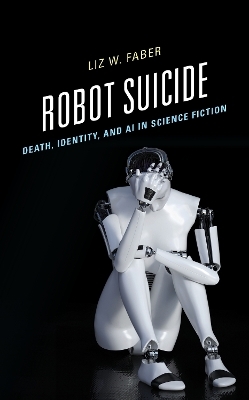
Robot Suicide
Death, Identity, and AI in Science Fiction
Seiten
2023
Lexington Books/Fortress Academic (Verlag)
978-1-6669-1048-3 (ISBN)
Lexington Books/Fortress Academic (Verlag)
978-1-6669-1048-3 (ISBN)
In Robot Suicide: Death, Identity, and AI in Science Fiction, Liz W. Faber blends cultural studies, philosophy, sociology, and medical sciences to show how fictional robots hold up a mirror to our cultural perceptions about suicide and can help us rethink real-world policies regarding mental health.
In Robot Suicide: Death, Identity, and AI in Science Fiction, Liz W Faber blends cultural studies, philosophy, sociology, and medical sciences to show how fictional robots hold up a mirror to our cultural perceptions about suicide and can help us rethink real-world policies regarding mental health. For decades, we’ve been asking whether we could make a robot live; but a new question is whether a living robot could make itself die. And if it could, how might we humans react? Suicide is a longstanding taboo in Western culture, particularly in relationship to mental health, marginalized identities, and individual choice. But science fiction offers us space to tackle the taboo by exploring whether and under what circumstances robots—as metaphorical stand-ins for humans—might choose to die. Faber looks at a broad range of science fiction, from classics like The Terminator franchise to recent hits like C. Robert Cargill’s novel Sea of Rust.
In Robot Suicide: Death, Identity, and AI in Science Fiction, Liz W Faber blends cultural studies, philosophy, sociology, and medical sciences to show how fictional robots hold up a mirror to our cultural perceptions about suicide and can help us rethink real-world policies regarding mental health. For decades, we’ve been asking whether we could make a robot live; but a new question is whether a living robot could make itself die. And if it could, how might we humans react? Suicide is a longstanding taboo in Western culture, particularly in relationship to mental health, marginalized identities, and individual choice. But science fiction offers us space to tackle the taboo by exploring whether and under what circumstances robots—as metaphorical stand-ins for humans—might choose to die. Faber looks at a broad range of science fiction, from classics like The Terminator franchise to recent hits like C. Robert Cargill’s novel Sea of Rust.
Liz W. Faber is assistant professor of English and communication at Dean College and adjunct instructor of scientific and academic writing at University of Maryland Baltimore’s Graduate School.
Introduction: When Robots Choose to Die
Chapter 1 – Morbid Machines: Interiority and Mental Health
Chapter 2 – Automated Altruism: Self-Sacrifice and US War Culture
Chapter 3 – The Human Touch: Eugenics and Assisted Suicide
Conclusion: Programming Life and Death
| Erscheinungsdatum | 13.04.2023 |
|---|---|
| Sprache | englisch |
| Maße | 158 x 238 mm |
| Gewicht | 336 g |
| Themenwelt | Literatur ► Fantasy / Science Fiction ► Science Fiction |
| Kunst / Musik / Theater ► Film / TV | |
| Geisteswissenschaften ► Sprach- / Literaturwissenschaft ► Anglistik / Amerikanistik | |
| Geisteswissenschaften ► Sprach- / Literaturwissenschaft ► Literaturwissenschaft | |
| Sozialwissenschaften ► Kommunikation / Medien ► Medienwissenschaft | |
| ISBN-10 | 1-6669-1048-1 / 1666910481 |
| ISBN-13 | 978-1-6669-1048-3 / 9781666910483 |
| Zustand | Neuware |
| Informationen gemäß Produktsicherheitsverordnung (GPSR) | |
| Haben Sie eine Frage zum Produkt? |
Mehr entdecken
aus dem Bereich
aus dem Bereich


